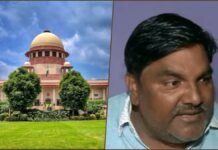
Key Points:
- Union Law Ministry formally initiated CJI appointment process on October 22-23, 2025, requesting Justice BR Gavai to recommend successor
- Current CJI BR Gavai scheduled to retire on November 23, 2025, after six-month tenure as 52nd Chief Justice of India
- Justice Surya Kant, senior-most judge after Gavai, set to assume office as 53rd CJI on November 24, 2025
- Justice Kant will serve 15-month tenure until retirement on February 9, 2027, when he turns 65
- Born February 10, 1962, in Hisar, Haryana; became youngest Advocate General of Haryana at age 38 in 2000
- Appointed permanent judge of Punjab & Haryana High Court in 2004; elevated to Chief Justice of Himachal Pradesh High Court in 2018
- Authored 291 Supreme Court judgments including key verdicts on Article 370 abrogation, Arvind Kejriwal bail, and AMU minority status
New Delhi: The Union Ministry of Law and Justice officially commenced the procedure to appoint India’s next Chief Justice by sending a formal communication to incumbent CJI BR Gavai on October 22-23, 2025, requesting him to recommend his successor. According to the Memorandum of Procedure (MoP) governing judicial appointments, the Union Law Minister seeks this recommendation approximately one month before the current CJI retires upon reaching the mandatory retirement age of 65 years. The MoP stipulates that the appointment should go to the senior-most Supreme Court judge considered fit to hold the office.
Justice Gavai’s Tenure
Chief Justice BR Gavai, appointed as the 52nd Chief Justice of India on May 14, 2025, is scheduled to retire on November 23, 2025, after serving a relatively brief six-month tenure. During his time as CJI, Justice Gavai was part of approximately 700 benches handling diverse legal matters spanning constitutional law, administrative law, criminal law, commercial disputes, arbitration, environmental law, and education. He authored around 300 judgments, including several Constitution Bench decisions upholding the rule of law and safeguarding fundamental rights, human rights, and legal rights of citizens. Justice Gavai was initially elevated as a Supreme Court judge on May 24, 2019, alongside Justice Surya Kant.
Justice Surya Kant: Background and Early Career
Justice Surya Kant was born on February 10, 1962, into a middle-class family in Hisar, Haryana. He completed his graduation from Government Post Graduate College, Hisar, in 1981, and obtained his Bachelor of Laws (LL.B.) degree from Maharshi Dayanand University, Rohtak, in 1984. That same year, he enrolled as an advocate and began his legal practice at the Hisar District Court. Within a year, in 1985, he shifted his practice to Chandigarh, appearing before the Punjab and Haryana High Court.
Career Milestones
Justice Kant’s professional trajectory accelerated significantly on July 7, 2000, when he was appointed as the youngest Advocate General of Haryana at age 38. Within nine months, in March 2001, he was designated as a senior advocate, a prestigious recognition of his legal expertise. On January 9, 2004, he was elevated as a permanent judge of the Punjab and Haryana High Court. After serving for over 14 years at the Punjab and Haryana High Court, Justice Kant was appointed as Chief Justice of the Himachal Pradesh High Court on October 5, 2018. His tenure at the High Court demonstrated his specialization in constitutional law, service matters, and civil litigation.
Supreme Court Elevation and Notable Judgments
Justice Surya Kant was elevated to the Supreme Court of India on May 24, 2019, alongside Justice BR Gavai, making them part of the same cohort of judges. Since his appointment, he has participated in several landmark Constitution Bench decisions that shaped India’s legal landscape. He was on the bench that upheld the abrogation of Article 370, which removed Jammu and Kashmir’s special status. He also served on the Constitution Bench that validated Section 6A of the Citizenship Act, dealing with citizenship rights in Assam.
In a notable dissent, Justice Kant was part of the bench examining the minority status of Aligarh Muslim University (AMU), where he authored a separate opinion disagreeing with the majority. He granted bail to former Delhi Chief Minister Arvind Kejriwal in the liquor policy corruption case investigated by the Central Bureau of Investigation (CBI), though he authored a separate opinion upholding the legality of Kejriwal’s arrest, holding that CBI followed due procedure. Justice Kant was also on the division bench that temporarily restricted YouTuber Ranveer Allahbadia from uploading content following the India’s Got Talent controversy, though this restriction was later relaxed.
He participated in the five-judge bench hearing the Presidential Reference concerning the constitutional powers of the Governor and the President. Justice Kant also heard the challenge to the Special Intensive Revision of Electoral Rolls in Bihar, where the bench directed the adoption of Aadhaar cards as documentary evidence for the voter registration exercise. Currently, he sits on the bench reviewing the landmark Vijay Madanlal Choudhary v Union of India (2022) judgment, which upheld extensive investigative powers of the Enforcement Directorate and stringent bail conditions under the Prevention of Money Laundering Act, 2002. According to the legal database Manupatra, Justice Kant has authored 291 judgments during his Supreme Court tenure.
Upcoming Tenure as Chief Justice
Upon appointment, Justice Surya Kant will assume charge as the 53rd Chief Justice of India on November 24, 2025, the day following Justice Gavai’s retirement. He will serve a tenure of nearly 15 months until his retirement on February 9, 2027, when he reaches the mandatory retirement age of 65. As Chief Justice, he will hold the position of Master of the Roster, responsible for constituting benches of two or more judges and allocating cases to them, a role that extends beyond merely presiding over cases to managing the Supreme Court’s administrative functions. The Chief Justice is considered “first among equals” among Supreme Court judges.
Succession Line
Following the principle of seniority that has governed CJI appointments for 75 years, with only two historical exceptions, when junior judges superseded senior Justice Vikram Nath is positioned to succeed Justice Surya Kant in February 2027. Justice Nath, currently the third-senior-most judge of the Supreme Court, will serve a relatively shorter tenure of seven months before retiring on September 23, 2027. This succession pattern ensures continuity in judicial leadership while maintaining the constitutional convention of appointing the senior-most judge deemed fit for the office.

















































